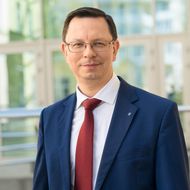HSE University among Top Universities in Digital Economy

HSE University took second place in the new 2023 ranking of universities in the digital economy in Moscow and St Petersburg, having lost only to Bauman Moscow State Technical University. HSE University outperformed specialised IT universities such as Moscow Institute of Physics and Technology (third place) and ITMO University (fifth place), as well as Moscow State University (fourth place).

HSE University Rector
‘HSE University has once again proven its leading position in the IT field. Our university has trained highly qualified engineers and specialists in computer science for ten years. Besides, we believe that digital competencies should be developed in all students. At HSE University, the educational IT module is mandatory for undergraduate students, regardless of their area of study. Today, we are especially interested in artificial intelligence technologies. And we will not merely develop education in this area, but will also try to build the university’s work in partnership with artificial intelligence.’
The ranking was prepared by ANO Digital Economy with support from the Information and Computer Technologies Industry Association (APKIT) and the Russian Ministry of Digital Development. As Sergey Plugotarenko, Director General of ANO Digital Economy, noted, the goal of the ranking is to create a tool for analysing and encouraging universities to more closely cooperate with business in training personnel. It is expected that the best IT universities will be announced annually.
The ranking assessed 304 leading universities and examined 63 areas of training and specialities related to IT personnel. The final results were prepared for two groups of universities: universities in Moscow and St Petersburg, and those in other parts of Russia.
The assessment of universities was carried out based on official statistics on the training of IT personnel (data from monitoring universities by Russia's Ministry of Education and Science) and a survey of 90 respondents conducted by ANO Digital Economy. The respondents were represented by leading technology companies: large accredited IT companies, founders of ANO Digital Economy, and members of APKIT. The survey contained only open-ended questions and, according to its results, the respondents’ mentioned 157 educational institutions from 56 constituent entities of Russia. The final ranking of Moscow and St Petersburg universities included 24 institutions. The final ranking of regional universities included 30 entries. Among regional universities, the top three included Ural Federal University, Novosibirsk State Technical University, and Novosibirsk State University.

One of the specialised departments for training IT specialists is HSE University’s Faculty of Computer Science. The Faculty of Computer Science is Russia's leading research and educational centre in this field and the overall leader in terms of the number of olympiad winners among applicants. In 2023, 93 prize-winners of the All-Russian Olympiad for schoolchildren enrolled in the faculty. In 2021, HSE University’s AI Research Centre was created at the Faculty of Computer Science.
Since 2017, HSE University has been developing digital competencies and competencies in working with big data among students of all educational programmes and fields. Since 2022, the Data Culture project, supported by Russia’s Ministry of Education and Science and Russia’s Ministry of Digital Development, has been integrated into the ‘Digital Department’ project of the ‘Priority 2030’ programme. HSE University was awarded the highest grant within the programme for teaching digital competencies to students.
HSE University students master big data analysis methods and tools to solve professional tasks in their field. Representatives of leading Russian digital companies take part in an independent assessment of end-to-end digital skills development.
HSE University is open to interaction with other universities. The university’s IT educational module can be implemented not only as part of double degree programmes with HSE University but also separately, in a mixed or completely online format. The model for integrating modules on digital competencies into the main educational programmes developed at HSE University allows students to master digital competencies in any field of training.
See also:
Larger Groups of Students Use AI More Effectively in Learning
Researchers at the Institute of Education and the Faculty of Economic Sciences at HSE University have studied what factors determine the success of student group projects when they are completed with the help of artificial intelligence (AI). Their findings suggest that, in addition to the knowledge level of the team members, the size of the group also plays a significant role—the larger it is, the more efficient the process becomes. The study was published in Innovations in Education and Teaching International.
HSE Tops the Ranking of Universities with the Best Employer Reputation
On October 16, 2025, Forbes Education published its list of the top 20 Russian universities with the best employer reputation in 2025. The ranking was based on a survey of leading Russian employers, who named the higher education institutions whose graduates they consider the most well-prepared and are most inclined to hire. HSE University took first place in the ranking.
Designing an Accurate Reading Skills Test: Why Parallel Texts are Important in Dyslexia Diagnosis
Researchers from the HSE Centre for Language and Brain have developed a tool for accurately assessing reading skills in adults with reading impairments. It can be used, for instance, before and after sessions with a language therapist. The tool includes two texts that differ in content but are equal in complexity: participants were observed to read them at the same speed, make a similar number of errors, and understand the content to the same degree. Such parallel texts will enable more accurate diagnosis of dyslexia and better monitoring of the effectiveness of interventions aimed at addressing it. The paper has been published in Educational Studies.
Intellectual Capital in the Face of Shocks: Russia and Iran Explore Internationalisation
In today's issue of Schola, Mariya Molodchik, Senior Research Fellow at the International Laboratory of Intangible-Driven Economy and Professor at the School of Economics and Finance at HSE University’s Campus in Perm, discusses a joint project with Iran University of Science and Technology, titled 'Internationalization of Companies from Developing Countries: The Role of Intellectual Resources in Response to Exogenous Shocks.'
HSE Graduate School of Business Once Again Tops Russian Business School Ranking
The HSE Graduate School of Business has reaffirmed its status as the leader of Russian business education. For the second year in a row, the GSB has topped the National Ranking of Business Schools, demonstrating consistently strong results across key learning indicators.
HSE Researchers Introduce Novel Symmetry-Aware Neural Network Architecture
Researchers at the HSE Laboratory for Geometric Algebra and Applications have developed a new neural network architecture that can accelerate and streamline data analysis in physics, biology, and engineering. The scientists presented their solution on July 16 in Vancouver at ICML 2025, one of the world's leading conferences on machine learning. Both the paper and the source code are publicly available.
Students from HSE and Other Universities Carry Out Research Expedition at New Chersonesos
As part of the Rediscovering Russia student expedition programme, HSE University organised a research trip under the framework of the School for Young Humanities Scholars to the New Chersonesos museum and church complex in Sevastopol. The results of this expedition will form the basis for proposals on educational projects aimed at shaping young people’s historical memory of the role of Chersonesos, Crimea, and the Byzantine legacy in the history of Russian culture and statehood.
HSE Researchers Determine Frequency of Genetic Mutations in People with Pulmonary Hypertension
For the first time in Russia, a team of scientists and clinicians has conducted a large-scale genetic study of patients with pulmonary arterial hypertension. The team, which included researchers from the International Laboratory of Bioinformatics at the HSE Faculty of Computer Science, analysed the genomes of over a hundred patients and found that approximately one in ten carried pathogenic mutations in the BMPR2 gene, which is responsible for vascular growth. Three of these mutations were described for the first time. The study has been published in Respiratory Research.
First Caucasus School on Experimental Research and Cognitive Sciences Takes Places in Adygea
On September 17–20, 2025, the First Caucasus School on Experimental Research and Cognitive Sciences took place at the Gornaya Legenda venue of Adyghe State University (ASU). The event was organised by the ASU Experimental Linguistics Laboratory, the HSE Centre for Language and Brain, and the HSE Centre for Sociocultural and Ethnolinguistic Studies. The school brought together over 50 participants—students, doctoral candidates, and early-career researchers from across Russia, along with lecturers and speakers from France, Serbia, China, Turkey, Kazakhstan, and Uzbekistan.
HSE Scientists Reveal How Disrupted Brain Connectivity Affects Cognitive and Social Behaviour in Children with Autism
An international team of scientists, including researchers from the HSE Centre for Language and Brain, has for the first time studied the connectivity between the brain's sensorimotor and cognitive control networks in children with autism. Using fMRI data, the researchers found that connections within the cognitive control network (responsible for attention and inhibitory control) are weakened, while connections between this network and the sensorimotor network (responsible for movement and sensory processing) are, by contrast, excessively strong. These features manifest as difficulties in social interaction and behavioural regulation in children. The study has been published in Brain Imaging and Behavior.


